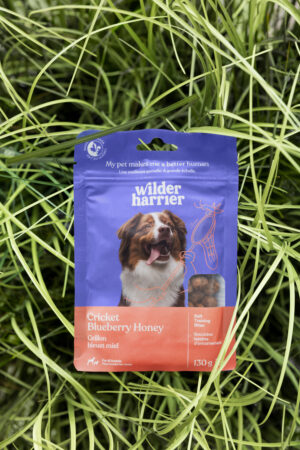
Wilder Harrier’s climate friendly pet food
By Monica Ferguson
Food Trends Pet Food Editor pick insect proteinAlternative proteins are the star ingredients in this B-Corp certified brand’s products
 Wilder Harrier is a young pet food company with an innovative product portfolio using novel ingredients. Photos © Wilder Harrier
Wilder Harrier is a young pet food company with an innovative product portfolio using novel ingredients. Photos © Wilder Harrier Just like in human-grade food, there are attempts to reduce the meat content in pet food in response to consumer needs for eco-friendly products.
With a curiosity in solving industrial farming challenges in the food system, Phil Poirier, who was then working a finance job in Montreal, stumbled across the 2013 FOA study, Edible insects: Future prospects for food and feed security, about the environmental benefits of insect protein and how it could help minimize the food industry’s carbon footprint.
Environmental benefits
Indeed, insects provide high-quality protein and nutrients compared to meat and fish while producing less GHGs than conventional livestock. For example, crickets need approx. 2000 times less water than cattle per kg of protein.
There are over 2000 species of edible insects. They’re rich in fibre and micronutrients like copper, iron, magnesium, manganese, phosphorous, selenium and zinc.
“Insects are far less land-dependent than conventional livestock farming and can be raised with minimal resources and investments on various substrates, especially in warm climates. It makes them an ideal protein source for at-risk populations,” said Poirier.
Poirier couldn’t stop thinking about how insect protein could be the answer to many food supply challenges. He shared the idea with his close friend, Paul Shenouda, and brother Mat Poirier. As they say, the rest is history. In January 2015, BugBites was born. In November 2016, they changed the brand name to Wilder Harrier.

Wilder Harrier’s co-founders, Phil Poirier, Paul Shenouda, and Mat Poirier.
Market research
The team conducted surveys to measure customers’ willingness to eat insects vs. feed them to their pet. They found about 20 per cent of people were open to the idea for themselves, whereas four times more people were willing to offer them to their pets.
“They considered where the research could have the most impact and reached out to a veterinarian friend as well as a leading pet food formulator,” said Caitlin Benn, director of marketing, Wilder Harrier. “After learning that insects had a strong potential for allergy relief in dogs, they quickly realized they could help pets, their people, and the planet in a profound way. They then got to cooking, literally.”
The team settled on crickets since it was the most widely available edible insect at the time with a promising supply chain. “It was also the most consumer-friendly insect on a cultural and psychological levels. They were perceived by early adopters as a superfood with many nutritional claims (B12, iron, omega-3),” said Benn.

Wilder Harrier offers training bites in shiitake turmeric, banana peanut, blueberry honey and pumpkin carrot flavours.
Product launch
In November 2015, their first product—oven-baked biscuits made with cricket protein in the two flavours of banana peanut and apple cranberry—was listed in Mondou, one of Quebec’s largest pet retailers, as well as a few other stores in the province.
“The biscuits have since been discontinued and evolved into our soft, low calorie cricket training bites. These bites are a hypoallergenic treat for many reaction-prone pups,” said Benn.
Wilder Harrier has come a long way since they started in 2015, when they were cooking, and tasting, cricket treats themselves. All products are now manufactured in a small, family-owned facility in Montreal with low-temperature extrusion to maintain the nutritional integrity of the ingredients. The company uses unconventional ingredients like invasive carp, crickets and black soldier fly to manufacture farmed insects dry food and cricket training bites.
The company sources most of the protein from local suppliers, with over 90 per cent coming from Canada and the U.S. The black soldier flies come from a variety of insect farms in Quebec, British Columbia, and Europe. The invasive carp are wild caught by small-scale fisheries in Illinois, U.S.
Brand growth
Available direct-to-consumer, the brand is filling up shelves across North America. In fall 2022, it began retailing at Pet Valu. Wilder Harrier products are now distributed in over 1000 retail locations across Canada. In March 2023, Wilder Harrier launched at Whole Foods in the Pacific Northwest. It has plans to expand that retail partnership across the U.S.
The search for other flavourful and nutritious proteins continues at Wilder Harrier. Later this year, the company will be launching a dental chew made with upcycled spent barley from Evergrain by AB InBev.
“We’ve been gaining a lot of momentum recently, particularly among consumers with allergy-prone dogs. This is largely driven by the novelty of our sustainable proteins. There’s still a lot of dogs, though, suffering from itchy skin, hot spots, chronic ear infections, and other recurrent allergy symptoms. We hope to reach and help bring some relief to them,” said Benn.
“It can be tough for people to wrap their heads around, but we think that if they learn the proven, life-changing benefits these ingredients are having on our pets and the environment, the knee-jerk ‘yuck’ reaction will be easy to overcome,” said Poirier.
The Wilder Harrier team is made up of six full-time employees, which includes the co-founders. Their first employee was hired in November 2020.
The business stemmed from a desire to find new and creative solutions to growing environmental problems. Wilder Harrier partners with Quebec-based Loop Mission to use the leftover fruit and veggie pulp that comes from the making of Loop juices in its vegan biscuits. In 2022, Wilder Harrier become B Corp certified. Additionally, the company donates one per cent of their total annual sales to grassroots environmental groups via their partnership with 1% for the Planet.
With the goal to divert empty pet food bags from landfills, Wilder Harrier created a mail-in recycling program. The brand has saved 156,020,636 L of water, 283,919 kg of CO2, and 576,459 kg of fruits and veggies.
“Ultimately, if we can become the Patagonia of the pet industry, with unfaltering, quality products and an unwavering commitment toward sustainability, then we’ll have succeeded in what we set out to accomplish,” said Poirier.
This article was originally published in the June/July 2023 issue of Food in Canada.
Print this page